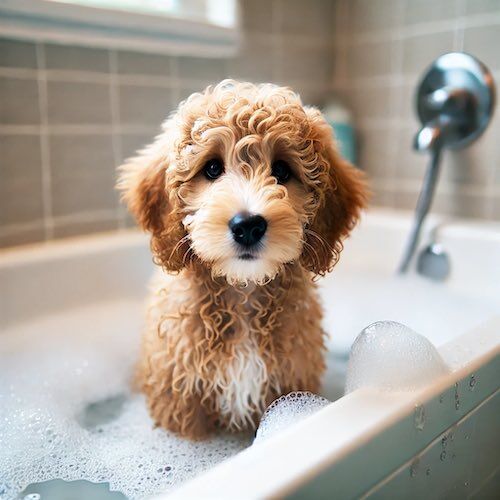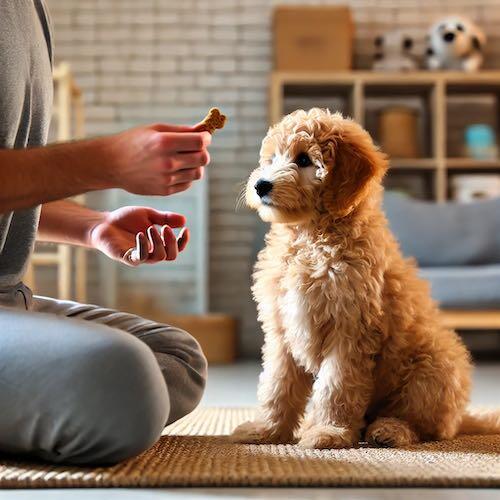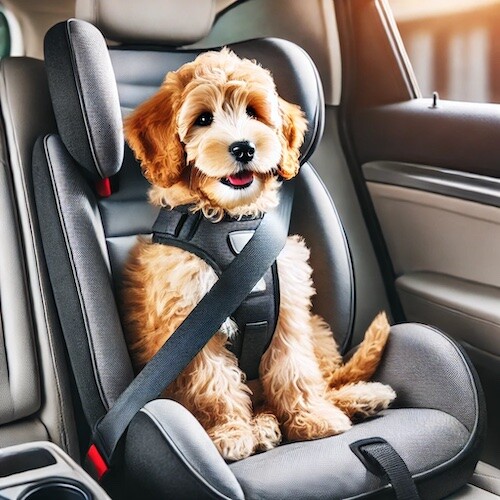
Goldendoodle Puppies: The Ultimate Guide for New Dog Owners
Search Best Goldendoodle Puppy Products Here
Introduction
Goldendoodle puppies are a popular choice for dog lovers due to their friendly temperament, intelligence, and hypoallergenic coats. As a hybrid breed, Goldendoodles combine the best traits of Golden Retrievers and Poodles, making them excellent family pets.
This ultimate guide aims to provide new dog owners with comprehensive information on caring for Goldendoodle puppies, including their history, characteristics, health care, training, and much more. Whether you’re a first-time dog owner or an experienced pet parent, this guide will help you understand and care for your new furry friend.
Welcoming a Goldendoodle into your home is an exciting and rewarding experience. These dogs are known for their gentle nature and versatility, fitting well into various lifestyles, from active families to individuals seeking a loyal companion. Their intelligence and eagerness to please make them highly trainable, while their hypoallergenic coats are a blessing for allergy sufferers. This guide will cover everything from the breed’s origins to practical tips for everyday care, ensuring you are well-prepared to provide a loving and supportive environment for your Goldendoodle puppy.
History and Origins of the Goldendoodle
The Goldendoodle is a relatively new breed, first developed in the late 20th century. Breeders aimed to combine the friendly, tolerant nature of the Golden Retriever with the low-shedding coat of the Poodle. The result is a designer dog that quickly gained popularity for its desirable traits. The breed’s history reflects a growing trend towards creating hybrid dogs that cater to specific needs, such as hypoallergenic coats and balanced temperaments.
The concept of creating hybrid breeds like the Goldendoodle began with the goal of developing a guide dog suitable for people with allergies. Wally Conron, an Australian breeder, is credited with breeding the first Labradoodle in the 1980s, which laid the groundwork for other Poodle hybrids. The Goldendoodle followed soon after, with breeders recognizing the potential for combining the Poodle’s intelligence and hypoallergenic coat with the Golden Retriever’s friendly and sociable nature.
Goldendoodles have since evolved into one of the most sought-after designer breeds, known for their versatility and adaptability. They have been used as therapy dogs, service dogs, and beloved family pets. The breed’s popularity has also led to the development of different generations of Goldendoodles, such as F1 (first-generation), F1b (backcross with Poodle), and multigenerational Goldendoodles, each with varying degrees of Poodle and Golden Retriever traits.
Physical Characteristics
Goldendoodles are known for their charming looks and varied appearances, which can differ based on their genetic makeup. Here are some key physical characteristics:
Size and Weight
Goldendoodles come in three main sizes: miniature (15-30 pounds), medium (30-45 pounds), and standard (45-100 pounds), depending on the size of the Poodle parent. This size variation makes them suitable for a range of living situations, from apartments to larger homes. Regardless of their size, Goldendoodles typically have a well-proportioned, athletic build that exudes both strength and grace.
Coat and Colors
Their coats can be curly, wavy, or straight and come in a variety of colors, including cream, apricot, red, gold, black, and chocolate. The coat type and color can vary widely even within the same litter, reflecting the genetic diversity of the breed. The texture of the coat is usually soft and can range from fine to coarse, depending on the mix of genes inherited from the Poodle and Golden Retriever parents.
Face and Expression
Goldendoodles typically have expressive, round eyes, a broad head, and a well-proportioned body. Their friendly expression mirrors their approachable personality. The ears are usually floppy, adding to their endearing appearance. Their noses are typically black or brown, and their muzzles are well-defined, neither too long nor too short, giving them a balanced and appealing look.
Maintenance
Maintaining a Goldendoodle’s physical appearance requires regular grooming due to their dense, often curly coats. Regular brushing is essential to prevent matting and tangling, while professional grooming every few months helps keep their coat healthy and manageable. Despite their low-shedding nature, Goldendoodles can still produce dander, so consistent grooming and cleaning are important for maintaining their hypoallergenic qualities.

Personality and Temperament
Goldendoodles are celebrated for their excellent temperaments, making them ideal pets for families, singles, and seniors alike. Key traits include:
Friendly
Goldendoodles are sociable dogs that get along well with people and other animals. They are known for their gentle and tolerant nature, making them great companions for children and other pets. Their friendly demeanor means they are more likely to greet strangers with enthusiasm rather than suspicion, which can make them less suitable as guard dogs but excellent as social pets.
Intelligent
Their high intelligence makes them easy to train and eager to please. Goldendoodles excel in obedience training and can quickly learn new commands and tricks. Their intelligence also means they need mental stimulation to stay happy and engaged, so incorporating puzzle toys and interactive games into their routine is beneficial.
Affectionate
These dogs are known for their loving nature and enjoy spending time with their human companions. They thrive on attention and are happiest when they are part of the family activities. Goldendoodles are often described as “velcro dogs” because of their tendency to stick close to their owners, seeking out cuddles and affection.
Energetic
Goldendoodles have a playful side and require regular exercise to stay healthy and happy. They enjoy a variety of activities, from playing fetch to going on hikes. Their energy levels can vary depending on their size and the traits they inherit from their parents, but regular physical activity is crucial for all Goldendoodles to prevent boredom and promote overall well-being.
Adaptable
Goldendoodles are highly adaptable and can thrive in different living environments as long as their physical and emotional needs are met. They can adjust to apartment living if given enough exercise and mental stimulation, and they equally enjoy spacious homes with large yards. Their adaptability also extends to different family dynamics, making them suitable for both single-person households and large families.
Preparing for Your Goldendoodle Puppy
Before bringing a Goldendoodle puppy home, it’s essential to prepare your living space and gather the necessary supplies. Here’s a checklist to help you get started:
Living Space
Puppy-proof your home by removing hazards, securing loose wires, and creating a designated area for your puppy to rest and play. Goldendoodles are curious and playful, so ensuring their environment is safe is crucial. Use baby gates to block off unsafe areas and ensure that all small objects and toxic substances are out of reach.
Essential Supplies
You’ll need items such as a comfortable bed, food and water bowls, toys, grooming tools, a collar and leash, and a crate for training and travel. Additionally, invest in puppy pads for housebreaking and a variety of chew toys to help with teething. Choose high-quality, durable items that can withstand a puppy’s playful nature.
Choosing a Veterinarian
Find a local veterinarian experienced with hybrid breeds and schedule an initial check-up for your puppy. Regular veterinary care is essential for monitoring your puppy’s health and addressing any issues early on. Building a relationship with a trusted vet ensures that your Goldendoodle receives the best possible care throughout their life.
Socialization Plan
Start planning how you will socialize your puppy from an early age. Exposing them to different environments, people, and other animals helps them grow into well-adjusted adults. Enroll in puppy socialization classes and arrange playdates with other dogs to build your Goldendoodle’s confidence and social skills.
Training Schedule
Establish a training schedule that incorporates basic obedience training, housebreaking, and socialization. Consistency is key, so set aside specific times each day for training sessions. Positive reinforcement techniques, such as treats and praise, work best with Goldendoodles due to their eagerness to please.
Health Insurance
Consider investing in pet health insurance to help cover the cost of unexpected medical expenses. Goldendoodles, like all dogs, can face health issues, and having insurance can provide peace of mind and financial support when needed. Research different insurance plans and choose one that best suits your needs and budget.

Read More: Best Rated Dry Dog Food Brands
Nutrition and Feeding
Proper nutrition is crucial for the health and growth of your Goldendoodle puppy. Here are some guidelines to follow:
Puppy Food
Choose a high-quality puppy food specifically formulated for their size and breed. Look for balanced nutrients, including proteins, fats, carbohydrates, vitamins, and minerals. Grain-free options can be beneficial for puppies with sensitive stomachs, but always consult your veterinarian for recommendations tailored to your puppy’s specific needs.
Feeding Schedule
Puppies should be fed three to four times a day until they are about six months old. After that, you can switch to two meals a day. Consistent feeding times help regulate your puppy’s metabolism and prevent overeating. Establish a routine and stick to it to help your puppy feel secure and well-fed.
Portion Control
Follow the feeding guidelines on the dog food packaging and adjust based on your puppy’s weight and activity level. Avoid overfeeding to prevent obesity, which can lead to health issues. Use a measuring cup to ensure accurate portion sizes and monitor your puppy’s weight regularly.
Hydration
Ensure your puppy has access to fresh, clean water at all times. Dehydration can lead to serious health problems, so make sure your Goldendoodle always has a full water bowl. Clean the bowl daily to prevent the growth of bacteria and ensure your puppy is drinking from a hygienic source.
Treats and Supplements
While treats can be useful for training, it’s important not to overdo it. Choose healthy, low-calorie treats and use them sparingly. Supplements, such as omega-3 fatty acids for coat health and glucosamine for joint support, can be beneficial, but always consult your veterinarian before adding any supplements to your puppy’s diet.

Grooming Needs
Goldendoodles require regular grooming to keep their coats healthy and tangle-free. Here are some grooming tips:
Brushing
Brush your puppy’s coat several times a week to prevent matting and tangles. Use a slicker brush and a comb for best results. Regular brushing helps distribute natural oils, keeping the coat shiny and healthy. It also provides an opportunity to check for any skin issues or parasites.
Bathing
Bathe your Goldendoodle every few weeks using a gentle dog shampoo. Be sure to dry their coat thoroughly to prevent skin issues. Over-bathing can strip the coat of its natural oils, so only bathe your puppy when necessary. Use a dog-specific conditioner to keep the coat soft and manageable.
Ears and Eyes
Clean your puppy’s ears weekly to prevent infections and wipe their eyes daily to remove tear stains. Goldendoodles, especially those with floppy ears, are prone to ear infections. Use a veterinarian-recommended ear cleaner and avoid using cotton swabs, which can damage the ear canal.
Nail Trimming
Trim your puppy’s nails regularly to prevent overgrowth and discomfort. If you’re unsure how to do this, ask your veterinarian or a professional groomer for help. Long nails can cause pain and lead to joint issues, so keeping them trimmed is important for your puppy’s comfort and mobility.
Dental Care
Brush your puppy’s teeth several times a week using a dog-specific toothbrush and toothpaste to prevent dental problems. Regular dental care helps prevent plaque buildup, gum disease, and bad breath. Dental chews and toys can also help keep your puppy’s teeth clean between brushings.
Professional Grooming
Consider scheduling regular appointments with a professional groomer, especially if your Goldendoodle has a curly coat. Professional grooming can help maintain the coat’s health and appearance, and groomers can provide services such as haircuts, ear cleaning, and nail trimming that can be challenging to do at home.
Health and Wellness
Maintaining your Goldendoodle puppy’s health is essential for their overall well-being. Here are some key aspects of health care:
Vaccinations
Ensure your puppy receives all necessary vaccinations to protect against common diseases. Follow your veterinarian’s recommended vaccination schedule. Regular vaccinations help prevent serious diseases such as parvovirus, distemper, and rabies.
Parasite Prevention
Use preventive treatments for fleas, ticks, and heartworms as advised by your veterinarian. Regular parasite prevention is crucial to protect your Goldendoodle from common pests that can cause serious health issues. Your vet can recommend the best products and schedule for your puppy’s needs.
Spaying/Neutering
Discuss spaying or neutering with your veterinarian. This procedure can help prevent certain health issues and unwanted behaviors. Spaying or neutering can also reduce the risk of certain cancers and help control the pet population. Your vet can advise on the best time for this procedure based on your puppy’s health and development.
Regular Check-Ups
Schedule regular veterinary check-ups to monitor your puppy’s health and catch any potential issues early. Regular visits allow your vet to perform routine exams, administer vaccinations, and provide preventive care. Early detection of health issues can lead to more effective treatment and better outcomes.
Common Health Issues
Be aware of common health problems in Goldendoodles, such as hip dysplasia, allergies, and ear infections. Regular vet visits and proper care can help manage these issues. Understanding the signs of these conditions and seeking prompt veterinary care can improve your Goldendoodle’s quality of life.
Health Insurance
Consider investing in pet health insurance to help cover the cost of unexpected medical expenses. Goldendoodles can be prone to certain health issues, and having insurance can provide peace of mind and financial support when needed. Research different insurance plans and choose one that best suits your needs and budget.

Training Your Goldendoodle Puppy
Training is an essential part of raising a well-behaved Goldendoodle puppy. Here are some training tips:
Housebreaking
Start housebreaking your puppy as soon as you bring them home. Use positive reinforcement, consistency, and patience. Crate training can be helpful for housebreaking. Establish a routine and take your puppy outside frequently, especially after meals, naps, and playtime. Praise and reward your puppy for going to the bathroom outside to reinforce good behavior.
Basic Commands
Teach your puppy basic commands like sit, stay, come, and down. Use positive reinforcement techniques, such as treats and praise, to encourage good behavior. Training sessions should be short and fun to keep your puppy engaged. Consistency is key, so practice commands regularly and be patient as your puppy learns.
Socialization
Expose your puppy to different people, places, and other animals to help them become well-adjusted and confident. Puppy socialization classes can be beneficial. Positive experiences during the socialization period can help prevent fear and aggression later in life. Gradually introduce your puppy to new situations and provide plenty of positive reinforcement.
Leash Training
Teach your puppy to walk on a leash without pulling. Start with short, positive experiences and gradually increase the duration of walks. Use treats and praise to encourage your puppy to walk beside you. Consistent leash training can help prevent pulling and make walks more enjoyable for both you and your puppy.
Problem-Solving
Address common behavior problems, such as chewing, barking, and digging, with positive reinforcement and redirection. Provide appropriate chew toys and engage your puppy in interactive play to prevent boredom. Training should focus on rewarding good behavior rather than punishing bad behavior. Understanding the root cause of behavior issues can help you address them effectively.
Exercise and Playtime
Goldendoodles are active dogs that need regular exercise to stay healthy and happy. Here’s how to ensure your puppy gets enough physical activity:
Daily Walks
Take your puppy for daily walks to provide physical exercise and mental stimulation. Short, frequent walks are ideal for puppies. Regular walks help maintain your puppy’s weight, improve cardiovascular health, and provide an opportunity for socialization. Be mindful of extreme temperatures, as Goldendoodles can be sensitive to heat and cold.
Playtime
Engage in interactive play sessions with your puppy using toys and games. Goldendoodles enjoy fetch, tug-of-war, and puzzle toys. Playtime helps burn off excess energy and strengthens the bond between you and your puppy. Vary the types of toys and games to keep your puppy interested and challenged.
Safe Environment
Ensure that your play area is safe and secure. Supervise your puppy during playtime to prevent accidents or injuries. Create a designated play area with appropriate toys and activities. Avoid rough play that could cause injury, especially considering the Goldendoodle’s playful and energetic nature.
Mental Stimulation
Provide mental stimulation through training, puzzle toys, and interactive games. Goldendoodles are intelligent dogs that enjoy problem-solving activities. Keeping their minds engaged can help prevent boredom and reduce behavior problems. Rotate toys and introduce new challenges to keep your puppy mentally stimulated.
Social Play
Arrange playdates with other puppies and dogs to provide social interaction and help your Goldendoodle develop good social skills. Supervised play with well-behaved dogs can help your puppy learn appropriate play behavior and improve their socialization.

Travel and Safety
Traveling with your Goldendoodle puppy requires careful planning and consideration. Here are some tips for safe and enjoyable travel:
Car Travel
Use a crate or a dog seatbelt harness to keep your puppy secure while traveling in the car. Take regular breaks for bathroom breaks and water. Ensure your puppy is comfortable and has a familiar blanket or toy to help reduce anxiety during car rides.
Air Travel
If you plan to fly with your puppy, check the airline’s pet policy and make necessary arrangements. Ensure your puppy is comfortable in their travel crate. Some airlines have specific requirements for pet travel, so it’s important to plan ahead and meet all guidelines. Consider consulting your veterinarian for advice on traveling with your Goldendoodle.
Identification
Always have your puppy wear a collar with an ID tag that includes your contact information. Microchipping is also recommended for added security. In case your puppy gets lost, a microchip can help reunite you more quickly. Keep your contact information up to date in the microchip registry.
Safety Precautions
Keep your puppy away from dangerous areas, such as busy roads, and avoid leaving them unattended in hot or cold vehicles. Goldendoodles are prone to heatstroke, so it’s important to monitor their temperature and provide plenty of water. Never leave your puppy in a parked car, as temperatures can rise quickly and become dangerous.
Travel Essentials
Pack a travel bag with your puppy’s essentials, including food, water, bowls, leash, poop bags, and any medications. Having these items readily available can make travel more convenient and comfortable for both you and your puppy.
Goldendoodle Puppy Development Stages
Understanding the development stages of your Goldendoodle puppy can help you provide appropriate care and training at each stage. Here’s an overview:
Neonatal Stage (0-2 weeks)
Puppies are born blind and deaf, relying on their mother for nourishment and warmth. During this stage, they spend most of their time sleeping and eating. It’s important to provide a quiet, warm environment for the mother and her puppies.
Transitional Stage (2-4 weeks)
Puppies begin to open their eyes, hear sounds, and explore their surroundings. They start to develop their senses and coordination. This is a crucial time for gentle handling and socialization to help them become comfortable with human interaction.
Socialization Stage (4-12 weeks)
This is a critical period for socialization. Puppies learn important social skills from their mother and littermates and start interacting with humans. Introducing your puppy to a variety of people, animals, and environments during this stage can help them grow into well-adjusted adults. Positive experiences during this period are crucial for their development.
Juvenile Stage (3-6 months)
Puppies become more independent and curious. This is an ideal time for basic training and socialization. Consistency in training and exposure to new experiences can help your puppy develop good manners and social skills. Provide plenty of opportunities for play and exploration to satisfy their curiosity.
Adolescent Stage (6-12 months)
Puppies reach sexual maturity and may exhibit challenging behaviors. Consistent training and positive reinforcement are essential. During this stage, Goldendoodles may test boundaries and assert their independence. Continued training and patience are key to helping your puppy navigate this period successfully.
Adult Stage (1 year and beyond)
By the time your Goldendoodle reaches adulthood, they should be well-socialized, trained, and integrated into your family routine. Maintaining consistent care, training, and regular vet check-ups will help ensure your Goldendoodle remains happy and healthy throughout their life.
Understanding Goldendoodle Behavior
Goldendoodles have unique behavioral traits that new owners should understand to provide the best care:
Separation Anxiety
Goldendoodles can be prone to separation anxiety. Gradually acclimate your puppy to being alone for short periods and provide toys to keep them occupied. Creating a comfortable space and using positive reinforcement can help reduce anxiety when you’re not home.
Barking
Goldendoodles can be vocal. Training and socialization can help manage excessive barking. Address the underlying causes of barking, such as boredom or anxiety, and provide appropriate outlets for their energy.
Stubbornness
This breed can be stubborn, so patience and consistent training are key. Use positive reinforcement to encourage good behavior. Understanding your Goldendoodle’s personality and working with their natural tendencies can make training more effective.
Lap Dogs
Despite their active nature, Goldendoodles love to cuddle and be close to their owners. They make excellent companions for relaxation and bonding. Providing plenty of affection and attention can help strengthen the bond between you and your Goldendoodle.
Playfulness
Goldendoodles have a playful side and enjoy interactive games with their owners. Providing plenty of playtime and mental stimulation can help prevent behavior problems and strengthen the bond between you and your puppy.
Choosing a Goldendoodle Puppy
Selecting a Goldendoodle puppy involves careful consideration. Here are some tips to help you choose the right puppy:
Reputable Breeders
Look for reputable breeders who prioritize health, temperament, and responsible breeding practices. Avoid puppy mills and backyard breeders. A reputable breeder will provide health clearances for the puppy’s parents and allow you to visit their facility.
Health Checks
Ensure the puppy has received initial vaccinations and health checks. Ask to see health clearances for the puppy’s parents. A healthy puppy should be active, alert, and free from signs of illness.
Temperament
Observe the puppy’s temperament. Look for a puppy that is friendly, curious, and well-socialized. A good breeder will help match you with a puppy that suits your lifestyle and preferences.
Questions to Ask
Ask the breeder questions about the puppy’s health, lineage, and care requirements. Inquire about the parents’ health history, the socialization process, and any potential genetic issues. A knowledgeable breeder will be happy to answer your questions and provide guidance.
Adoption
Consider adopting a Goldendoodle puppy from a rescue organization or shelter. Many Goldendoodles in need of homes are waiting for loving families. Adoption can be a rewarding experience and provides a home for a dog in need.
Goldendoodle Puppy Activities and Games
Engaging your Goldendoodle puppy in various activities and games helps keep them mentally and physically stimulated. Here are some ideas:
Interactive Toys
Puzzle toys and treat-dispensing toys can keep your puppy entertained and mentally challenged. These toys encourage problem-solving and can help prevent boredom. Rotate toys regularly to keep your puppy interested.
Training Games
Incorporate training into playtime with games like hide-and-seek, where your puppy has to find you or a hidden treat. Training games can reinforce commands and provide mental stimulation. Use positive reinforcement and rewards to make training fun and engaging.
Fetch and Tug-of-War
These classic games provide physical exercise and strengthen the bond between you and your puppy. Goldendoodles enjoy interactive play and can benefit from games that challenge them physically and mentally. Always supervise play to ensure it remains safe and enjoyable.
Agility Training
Set up a mini agility course with tunnels, jumps, and weave poles to provide a fun and challenging activity for your Goldendoodle. Agility training can improve your puppy’s coordination and confidence. Start with simple obstacles and gradually increase the difficulty as your puppy becomes more comfortable.
Social Play
Arrange playdates with other puppies and dogs to provide social interaction and help your Goldendoodle develop good social skills. Supervised play with well-behaved dogs can help your puppy learn appropriate play behavior and improve their socialization.
Common Mistakes to Avoid
Avoiding common mistakes can help ensure a positive experience with your Goldendoodle puppy:
Inconsistent Training
Consistency is key in training. Mixed signals can confuse your puppy and hinder progress. Establish clear rules and routines, and ensure all family members follow them. Consistent training helps your puppy understand expectations and develop good behavior.
Lack of Socialization
Proper socialization is crucial for a well-adjusted dog. Expose your puppy to different environments, people, and animals. Positive socialization experiences can help prevent fear and aggression. Gradually introduce new situations and provide plenty of praise and rewards.
Overfeeding
Goldendoodles are prone to obesity. Stick to a feeding schedule and avoid giving too many treats. Monitor your puppy’s weight and adjust their diet as needed. Consult your veterinarian for guidance on portion sizes and healthy feeding practices.
Neglecting Grooming
Regular grooming is essential for a healthy coat. Neglecting grooming can lead to matting and skin issues. Establish a grooming routine that includes brushing, bathing, and cleaning your puppy’s wrinkles, ears, and teeth. Regular grooming helps prevent health problems and keeps your Goldendoodle looking and feeling their best.
Ignoring Health Issues
Be proactive about your puppy’s health and address any issues promptly. Regular vet check-ups and preventive care can help catch potential problems early. Stay informed about common Goldendoodle health issues and work with your veterinarian to keep your puppy healthy.
Conclusion
Welcoming a Goldendoodle puppy into your home is a rewarding experience filled with joy and companionship. By understanding their unique needs and providing proper care, training, and love, you can ensure a happy and healthy life for your new furry friend. This ultimate guide has provided you with the essential information to start your journey as a Goldendoodle owner. Enjoy the adventures and cherish the moments with your delightful Goldendoodle puppy! With patience, dedication, and the right approach, you’ll build a strong, loving bond with your Goldendoodle that will last a lifetime.
